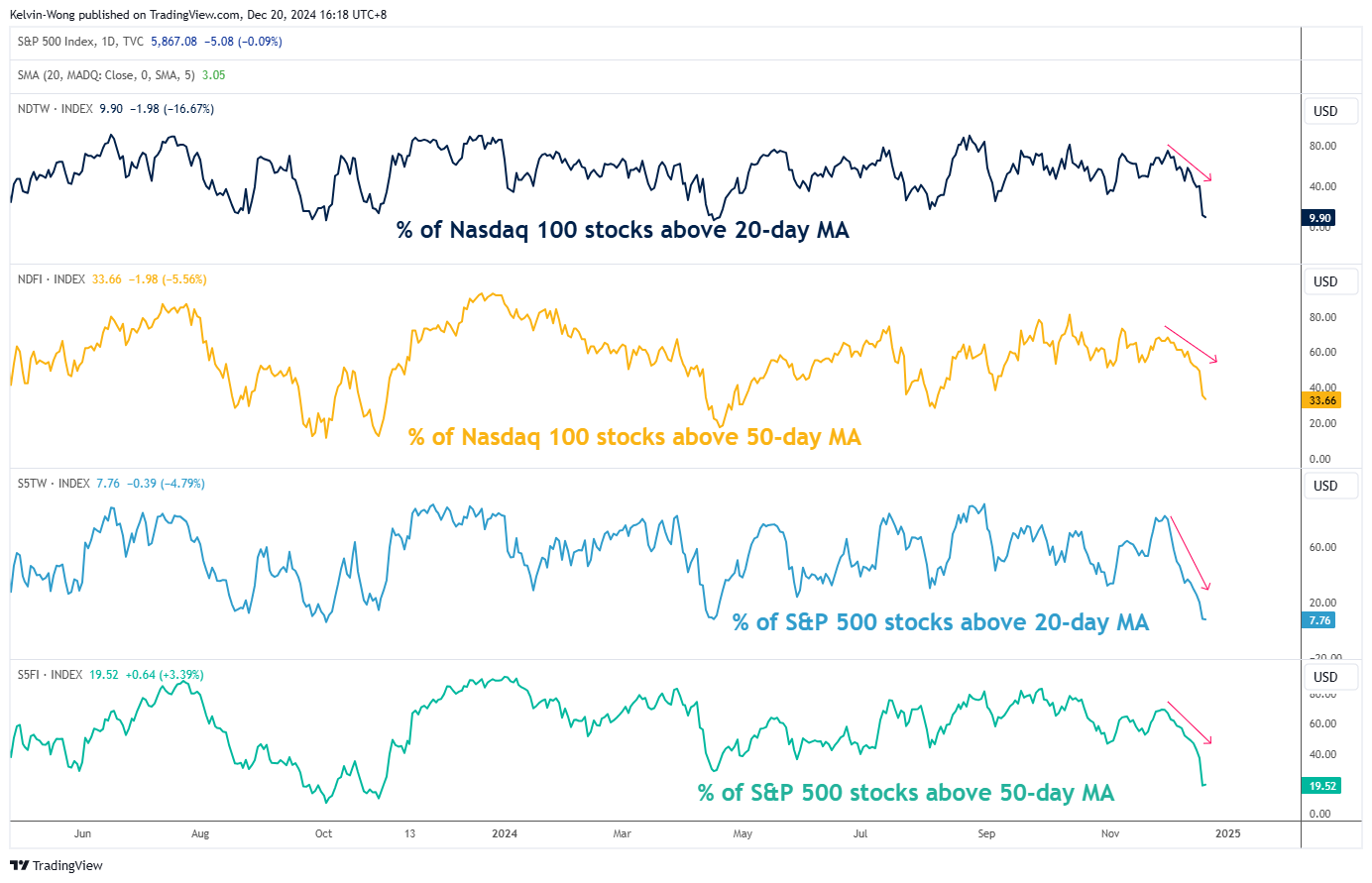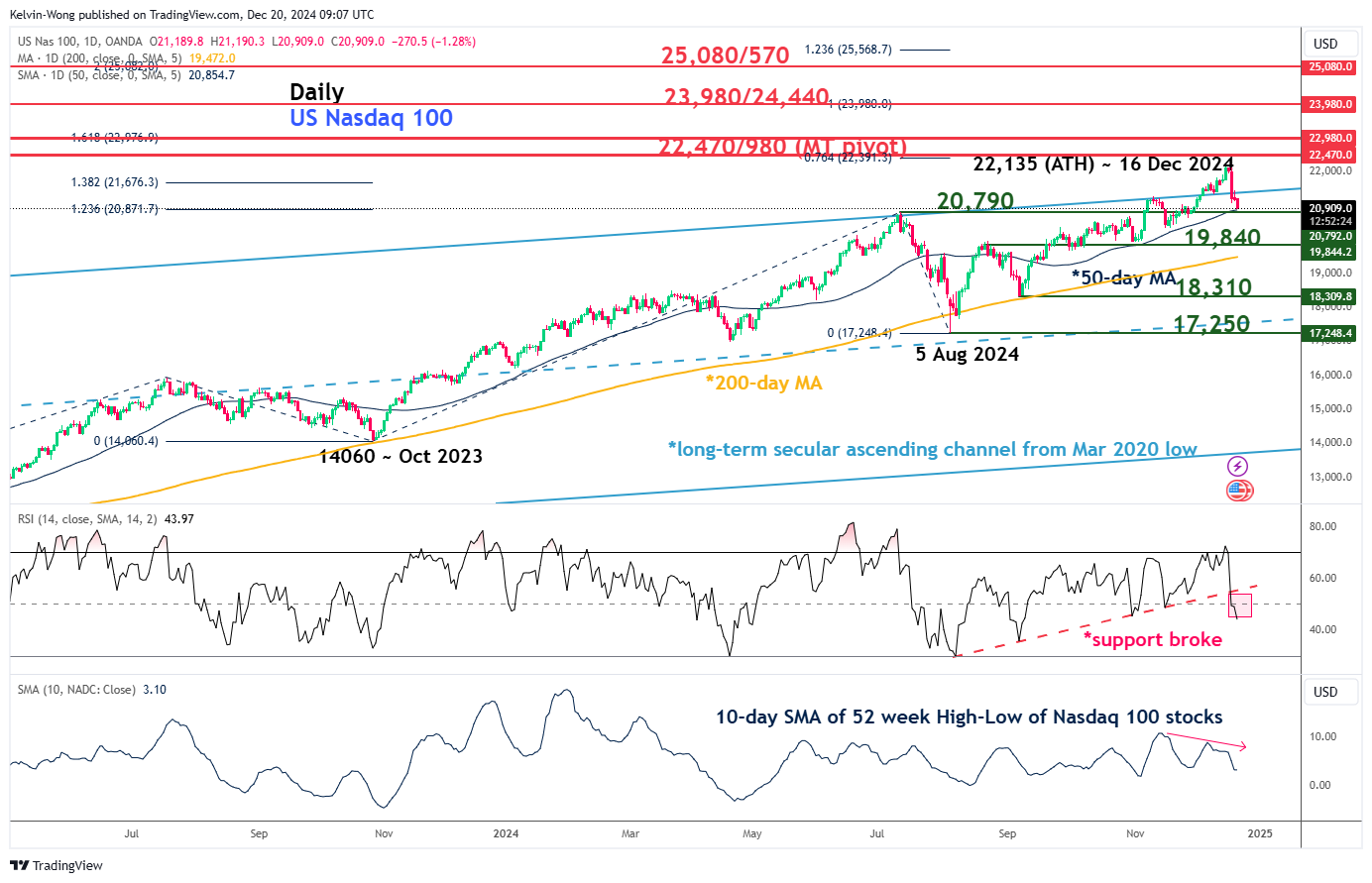- A transition from a Fed “dovish pivot” to a “normalization” pivot may put a halt to this year-end seasonal “Santa Rally” on the US stock indices.
- Nasdaq 100 momentum and market breadth have weakened which supports a potential medium-term (multi-week) corrective decline sequence.
- Watch the 20,790 downside trigger level of the Nasdaq 100.
The Nasdaq 100 has reversed its bullish momentum where at the start of this week, it was the sole major US benchmark stock index to print a fresh all-time high of 22,133 on Monday, 16 December.
The ex-post release of the US Federal Reserve monetary policy’s latest “dot plot” and Fed Chair Powell’s press conference on Wednesday, 18 December, have spooked the US stock market. The Fed has indicated the prospect of lesser interest rate cuts in 2025 due to the risk of inflationary pressure resurgence (some Fed officials have taken into account the effects of the incoming Trump administration’s “America First” policy).
The heightened prospect of a transition from a Fed “dovish pivot” to a “normalization” pivot in 2025 is likely the narrative at this juncture that may dim the hopes of the seasonal “Santa Rally” for this year-end.
The higher beta Nasdaq 100 recorded a loss of 4% from 18 December to 19 December (open to close) ex-post FOMC, the second worst performer among the four major US stock indices; Russell 2000 (-5.3%), S&P 500 (-3%), Dow Jones Industrial Average (-2.6%).
Several technical elements have now flashed out an increasing odd of a medium-term (multi-week) correction on the Nasdaq 100
Weak Market Breadth
Fig 1: Percentage of Nasdaq 100 and S&P 500 component stocks above 20-day & 50-day moving averages as of 19 Dec 2024 (Source: TradingView)
Since the start of December 2024, the percentage of Nasdaq 100 component stocks trading above their respective 20-day and 50-day moving averages has fallen. In contrast, the price actions of the Nasdaq 100 have kept rocketing upwards to print record highs in the recent two weeks.
Right now, the percentage of Nasdaq 100 component stocks trading above their respective 20-day moving averages have plummeted to 9.9% as of 19 December. Also, the Nasdaq 100 component stocks above their respective 50-day moving averages have declined to 33.7% (see Fig 1).
20,790 is the Last Line of Defense for the Nasdaq 100
Fig 2: Nasdaq 100 CFD major & medium-term trends as of 20 Dec 2024 (Source: TradingView)
The recent past three days of price actions of the Nasdaq 100 CFD Index (a proxy of Nasdaq 100 E-mini futures have reintegrated below the upper boundary of its long-term secular ascending channel from the March 2020 low. This observation suggests the bullish breakout seen on 4 December is a failure acceleration move.
Since its all-time high on 16 December, it has declined by 5.5%. It is now hovering right above its 50-day moving average, which is acting as key intermediate support at 20,790.
The latest reading seen from the daily RSI momentum indicator suggests that the 20,790 key intermediate support is likely to be a “weak support” as the RSI has broken below a parallel ascending trendline support and breached below the 50 level that indicates a revival of medium-term bearish momentum (see Fig 2).
In addition, fewer Nasdaq 100 component stocks managed to record new 52-week highs since 14 November 2024 as the 10-day moving average of the difference between new 52-week highs minus 52-week lows has shaped a lower high.
Hence, a break with a daily close below the 20,790 key intermediate support may trigger a multi-week corrective decline sequence to expose the medium-term supports of 19,840 and 18,310 in the first step.
On the other hand, clearance above the 22,470/980 medium-term pivotal resistance zone invalidates the bearish scenario for the continuation of its impulsive upmove sequence for the next medium-term resistances to come in at 23,980/24,440 and 25,080/570.
